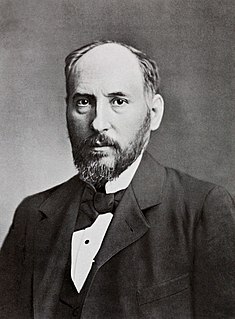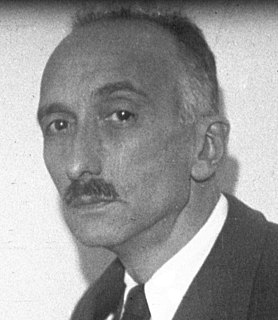A Quote by Santiago Ramon y Cajal
I would be the last to deny that the greatest scientific pioneers belonged to an aristocracy of the spirit and were exceptionally intelligent, something that we as modest investigators will never attain, no matter how much we exert ourselves. Nevertheless ... I continue to believe that there is always room for anyone with average intelligence ... to utilize his energy and ... any man could, if he were so inclined, be the sculptor of his own brain, and that even the least gifted may, like the poorest land that has been well-cultivated and fertilized, produce an abundant harvest.
Quote Topics
Abundant
Always
Any
Anyone
Aristocracy
Attain
Average
Been
Believe
Belonged
Brain
Continue
Could
Deny
Energy
Even
Exert
Gifted
Greatest
Harvest
His
How
How Much
Inclined
Intelligence
Intelligent
Investigators
Land
Last
Least
Like
Man
Matter
May
Modest
Much
Never
Nevertheless
Ourselves
Own
Pioneers
Poorest
Produce
Room
Scientific
Sculptor
Something
Spirit
Utilize
Well
Were
Will
Would
Would Be
Related Quotes
No matter how strong our resolve, we eventually find ourselves enslaved by the compulsive preference for one particular woman. You’ve been caught, my friend. You may as well reconcile yourself to it.” Nick did not bother trying to deny it. “I was going to be so much smarter than you,” he muttered. Sir Ross grinned. “I prefer to think that intelligence has nothing to do with it. For if a man’s intellect is measured by his ability to remain untouched by love, I would be the greatest idiot alive.
If the moon, in the act of completing its eternal way around the earth, were gifted with self-consciousness, it would feel thoroughly convinced that it was traveling its way of its own accord on the strength of a resolution taken once and for all. So would a Being, endowed with higher insight and more perfect intelligence, watching man and his doings, smile about man's illusion that he was acting according to his own free will.
If a man were only to deal in the world for a day, and should never have occasion to converse more with mankind, never more need their good opinion or good word, it were then no great matter (speaking as to the concernments of this world), if a man spent his reputation all at once, and ventured it at one throw; but if he be to continue in the world, and would have the advantage of conversation while he is in it, let him make use of truth and sincerity in all his words and actions; for nothing but this will last and hold out to the end.
The man who partakes in the breaking of the bread dares to build his house on the very core of love. He becomes, as it were, Godlike, but regardless of the strength he derives from it, his free will remains. We are always free to disown this immense grace, to abuse it. The Greatest Love may be betrayed. Fed on the Living Bread, we nevertheless conceal a part of ourselves which longs for swine's food.
How could he convey to someone who'd never even met her the way she always smelled like rain, or how his stomach knotted up every time he saw her shake loose her hair from its braid? How could he describe how it felt when she finished his sentences, turnec the mug they were sharing so that her mouth landed where his had been? How did he explain the way they could be in a locker room, or underwater, or in the piney woods of Maine, bus as long as Em was with him, he was at home?
We were taught to believe that the Great Spirit sees and hears everything, and that he never forgets; that hereafter he will give every man a spirit-home according to his deserts: if he has been a good man, he will have a good home; if he has been a bad man, he will have a bad home. This I believe, and all my people believe the same.
In my acquaintance with John Rawls, I found him to be a simple and honest man, who just by chance also happened to be the greatest moral philosopher of the twentieth century. I would like to think that I could emulate at least his modesty - his refusal to exaggerate his perception of himself and his place in the larger scheme of things - even if my work never compares with his in its importance.
Slowly, very slowly, he sat up, and as he did so he felt more alive, and more aware of his own living body than ever before. Why had he never appreciated what a miracle he was, brain and nerve and bounding heart? It would all be gone...or at least, he would be gone from it. His breath came slow and deep, and his mouth and throat were completely dry, but so were his eyes.
If he looked into her face, he would see those haunted, loving eyes. The hauntedness would irritate him - the love would move him to fury. How dare she love him? Hadn't she any sense at all? What was he supposed to do about that? Return it? How? What could his calloused hands produce to make her smile? What of his knowledge of the world and of life could be useful to her? What could his heavy arms and befuddled brain accomplish that would earn him his own respect, that would in turn allow him to accept her love?
Either [Jesus] was what he said he was or he was the world's greatest liar. It is impossible for me to believe a liar or charlatan could have had the effect on mankind that he has had for 2000 years. We could ask, would even the greatest of liars carry his lie through the crucifixion, when a simple confession would have saved him? ... Did he allow us the choice... to believe in his teaching but reject his statements about his own identity?
If it were possible for us to have so deep an insight into a man's character as shown both in inner and in outer actions, that every, even the least, incentive to these actions and all external occasions which affect them were so known to us that his future conduct could be predicted with as great a certainty as the occurrence of a solar or lunar eclipse, we could nevertheless still assert that the man is free.
The whole gospel of Karl Marx can be summed up in a single sentence: Hate the man who is better off than you are. Never under any circumstances admit that his success may be due to his own efforts, to the productive contribution he has made to the whole community. Always attribute his success to the exploitation, the cheating, the more or less open robbery of others. Never under any circumstances admit that your own failure may be owing to your own weakness, or that the failure of anyone else may be due to his own defects - his laziness, incompetence, improvidence, or stupidity.





































